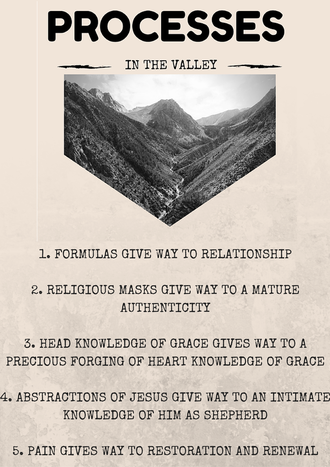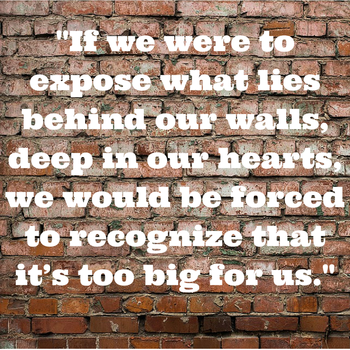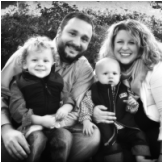 We’re surrounded by walls. As humans, we constantly erect walls because we want to keep others out. We put up cubicle walls to keep out coworkers. We put up house walls to keep out neighbors and maintain privacy. We put up metaphorical walls when we want emotional space from others. We seem to be obsessed with walls. Walls provide many functions, but one of their primary uses is to barricade us from others. Walls are generally a giant “Keep Out” sign. Our journey into the valley is full of walls as well. Jesus, the Good Shepherd, is intent on leading us beside quiet waters where He will restore our souls. But to get to those waters, He must topple many of our walls – often ones we were unaware we had put up. We talked about some of those walls in the second blog of this series – formulas and religious masks. The valley is a place where we experience pain and suffering… a place where our walls come into full view. We used to think these formulas were the keys to success. We thought these masks were what God, ourselves or others expected of us. But something is usually hidden behind these walls. Often it’s not even seen by us. We’ve hidden it because it seems too repulsive… too painful… too ugly to bring into the light. And so we hid it long ago. Perhaps it’s a fear, an anger, a deep doubt, a wound or an unwanted desire. We feel that if we were to bring it into the light, it would destroy us. The biggest thing that we’ve tucked carefully away from our affectionate Lord, however, is dependency. If we were to expose what lies behind our walls, deep in our hearts, we would be forced to recognize that it’s too big for us. We aren’t strong enough, powerful enough, faithful enough or loving enough. We’re dependent. And our walls are meant to cloak us in a disguise of power. They present the façade that we’ve got things together or have it all under control. You see, all of the formulas and religious masks are often self-salvation strategies we’ve subconsciously concocted to keep from admitting that We. Can’t. Fix. Ourselves. Even though we know deep down that there’s brokenness in our hearts. This brings us to the next process in the valley. Head Knowledge of Grace Gives Way to a Precious Forging of Heart Knowledge of Grace: The Scriptures say in many places, like 1 Peter 5:5, that “God opposes the proud, but gives grace to the humble.” And if there’s one thing the valley does, it humbles us. It melts away our proud walls. With our formulas and religious masks dissolved, we are left vulnerable, weak and dependent. We have come to the end of our strength and see that there must be one stronger, more faithful, more loving, more forgiving, more generous and patient, more powerful and wiser than we are because the weight of our brokenness is too much for us. This is Asaph’s story. We’ve followed him up to this point in our Valley blog series so let’s return to see how he experiences grace in the valley. Early on in the chapter, Asaph tells us of his proud walls and masks. He says that he has washed his hands in innocence and kept his heart pure. He’s livid when he accuses God of betraying him by not doling out rewards for his supreme moral behavior. But the valley melts away this weak formula that says if I live an obedient, good, or moral life, then God will bless my life in ways I’ve predetermined. This formula can’t withstand the heat of the valley. Next up is anger. Asaph says that he became a brute beast before God when life didn’t go the way he’d expected. He unleashed his anger on God. The tenderness of the Shepherd melted away even this because the affection of the Shepherd in the valley is no match for the anger we hold deep in our hearts.  Finally, Asaph is left with no formulas. He’s unmasked and vulnerable. He’s been humbled. His walls have melted away. But the Shepherd has never left his side. When the final wall falls, it reveals a fragile heart that is desperately in need of being restored beside quiet waters. This has been the Shepherd's aim all along. Restoration. Renewal. Healing. But just what was hiding behind Asaph’s walls? What was the secret that he had stowed away subconsciously? What was so ugly… so painful… so repulsive that Asaph had tucked it away in the depths of his heart? What was this thing that he hid away for fear that it could destroy him? The answer lies in Psalm 73:26 where Asaph speaks of the grace that God revealed through his struggle: “Though my heart and flesh fail me…” Deep down Asaph knew, as we all do, that he wasn't strong enough, loving enough, pure enough, courageous enough, forgiving enough, obedient enough, faithful enough… He knew what the Scriptures cry out over and over again that there is a brokenness within us that we simply cannot heal ourselves. All of the walls, formulas and masks – they were just facades… illusions concocted to perpetuate the lie that he could be His own Savior and Healer. Ironically, these walls were the very things that were keeping Asaph from the grace he so desperately needed. And let me stop here to confront one lie. This is not simply the case when we first come to Christ for salvation. This is our condition throughout our entire journey with Christ. The Good Shepherd continually melts away our walls so that we can see that it is only be His grace that we are healed and transformed. The Shepherd led Asaph to the quiet waters to reveal his greatest fear. There by the waters, deep in the valley, Asaph could unmask the lie and admit that he needed grace. He needed One stronger than he. Later in his life, having drunk deeply of the waters of soul restoration, Asaph would reveal the grace that he found there in the valley: “Though my heart and flesh fail me, THE LORD is the strength of my heart and my portion forever.” His trust was now in the strength of the Shepherd. He was resting in grace. This brings us to the next process of the valley. Abstractions of Jesus Give Way to an Intimate Knowledge of Him as Shepherd: We don’t know whether Asaph’s situation changed. But we do know one thing, his affections were captured by the tenderness of our Lord in the Valley. At the end of the day, it’s not about how much we know about Jesus. After all, as an avid comics fan, I can tell you far more than you’d ever want to know about Captain America… but that doesn’t mean we have a deep friendship. Asaph crossed over though. He had a relationship with the Lord at the beginning of the Psalm, but it paled in comparison to the intimacy he had with Him at the end of his journey through the valley. We know this because early in the Psalm, Asaph shows us his cards. He’s after circumstantial happiness… money, happiness, health, etc. That’s his treasure. But by the end he says that THE LORD has become his reward. The Giver has captured his heart, not the gifts. And so Asaph says in verse 25, “Whom have I in heaven but you? And earth has nothing I desire besides you.” Pain Gives Way to Restoration and Renewal: At the outset of this series on Restoration in the Valley, I wrote that there is no such thing as graduation from the valley. There are no easy answers. There isn’t a formula. There are no magic band aids that make it all go away. It leaves you with a bit of a limp because you’re always aware of your dependency moving forward. You’re always aware of your tendency to stray into strategies of self-dependence. And yet, you are constantly, overwhelmingly aware of His grace… a grace that is far more powerful, healing, tender and transforming than you could have dreamt. And so, while we don’t graduate from the valley, we do look to the coming of the Great Shepherd King, Jesus Christ, who will come back to restore our souls and make us new once and for all. Grace and Rest for the journey, Nate |
Nate HorneI'm married to an incredible woman, Joni. We have two little treasures, Zach (4) and Jon (2). We moved out to Valley Haven Camp and Retreat Center in Hickory, NC in April of 2015 and are excited to see Jesus cultivate a relational context for restoration and renewal in His Gospel and grace out here under these beautiful mountains. Archives
November 2016
Categories |
Proudly powered by Weebly


 RSS Feed
RSS Feed